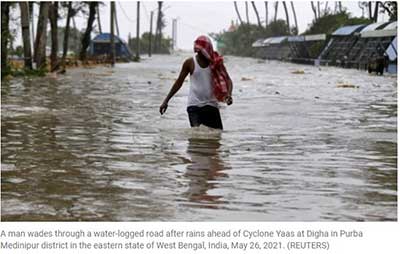Relevance: GS-3: Conservation, Environmental Pollution and Degradation, Environmental Impact Assessment.
Key Phrases: Sixth assessment report, Climate change, Incremental responses, Risks cascading, Vulnerabilities, World Meteorological Organization, United Nations Environment Programme, Climate resilient development, Ecosystem integrity
Why in News?
- The IPCC, a global body of scientists that makes periodic reviews of climate science, released the second part of its sixth assessment report. The adverse impacts of climate change are far greater, more frequent and vastly more disruptive than previously understood, a new assessment by the Intergovernmental Panel on Climate Change (IPCC) has said, warning that “minor” or “incremental” responses would not be sufficient to deal with the crisis.
Background:
- The first part of this sixth assessment report, on the physical science of climate change, was released in August last year. It had warned that 1.5 degree Celsius warming was likely to be achieved before 2040 itself. This second part of the report is about climate change impacts, risks and vulnerabilities, and adaptation options.
What is IPCC:
- The Intergovernmental Panel on Climate Change (IPCC) is the United Nations body for assessing the science related to climate change.
- It was established in 1988 by the World Meteorological Organization (WMO) and the United Nations Environment Programme (UNEP), and later endorsed by the United Nations General Assembly.
- IPCC assessments provide a scientific basis for governments at all levels to develop climate related policies, and they underlie negotiations at the UN Climate Conference – the United Nations Framework Convention on Climate Change (UNFCCC).
- It does not conduct original research nor monitor climate change, but rather undertakes a periodic, systematic review of all relevant published literature.
The latest report warns that multiple disasters induced by climate change are likely to emerge in different parts of the world in the next two decades, even if adequate efforts are made to keep the global rise in temperatures within 1.5 degree Celsius from pre-industrial times.
Warnings of the report:
- Irreversible impact of climate change: The report says, if the 1.5-degree Celsius threshold is breached, even if temporarily, there are likely to be “additional severe impacts”, some of them irreversible.
- Increased climate risks for coastal areas: Risks for society will increase, including to infrastructure and low-lying coastal settlements,” the IPCC report says.
- Interlinking and multiplying hazard: Multiple climate hazards will occur simultaneously, and multiple climatic and non-climatic risks will interact, resulting in compounding overall risk and risks cascading across sectors and regions.
- Reduced resilience and adaptation capacity: Capacity to adapt to the rising temperatures was already getting weaker, for living beings as well as natural systems, and it would reduce further with rising temperatures.
- Existing adaptation gap: There are large gaps in the adaptation actions that are being taken and the efforts that are required. It says these gaps are a result of “lack of funding, political commitment, reliable information, and sense of urgency
Adaptation, in response to current climate change, is reducing climate risks and vulnerability mostly via adjustment of existing systems. Many adaptation options exist and are used to help manage projected climate change impacts, but their implementation depends upon the capacity and effectiveness of governance and decision-making processes.

Suggestions of the report to develop climate resilience:
- Inclusive governance, investment aligned with climate resilient development, access to appropriate technology and rapidly scaled-up finance, and capacity building of governments at all levels enable climate resilient development.
- Building the resilience of biodiversity and supporting ecosystem integrity can maintain benefits for people, including livelihoods, human health and well-being as well as contributing to disaster risk reduction and climate change adaptation and mitigation.
- Taking integrated action for climate resilience to avoid climate
risk requires urgent decision making for the new built environment and
retrofitting existing urban design, infrastructure and land use.
- Equitable partnerships between local and municipal governments, the private sector, Indigenous Peoples, local communities, and civil society can advance climate resilient development by addressing structural inequalities.
- Structural vulnerabilities to climate change can be reduced
through carefully designed and implemented legal, policy, and process
interventions from the local to global that address inequities based on
gender, ethnicity, disability, age, location and income.
- This includes rights-based approaches that focus on capacity building, meaningful participation of the most vulnerable groups, and their access to key resources
Conclusion:
- It is clear now that minor, marginal, reactive or incremental changes won’t be sufficient. In addition to technological and economic changes, shifts in most aspects of society are required to overcome limits to adaptation, build resilience, reduce climate risk to tolerable levels, guarantee inclusive, equitable and just development and achieve societal goals without leaving anyone behind.
Sources: Indian Express
Mains Question:
Q. It is clear that business as usual is not good enough. As the infinite cost of climate change reaches irreversible highs, now is the time for bold collective action. Comment. [250 words].









